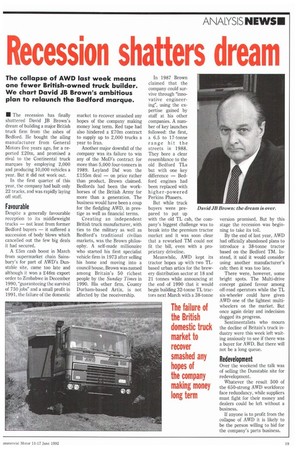Recession shatters dream
Page 21

If you've noticed an error in this article please click here to report it so we can fix it.
The collapse of AWD last week means one fewer British-owned truck builder. We chart David .1B Brown's ambitious plan to relaunch the Bedford marque.
/ The recession has finally shattered David JB Brown's dream of building a major British truck firm from the ashes of Bedford. He bought the ailing manufacturer from General Motors five years ago, for a reported 2,20m, and promised a rival to the Continental truck marques by employing 2,000 and producing 10,000 vehicles a year. But it did not work out.
In the first quarter of this year, the company had built only 22 trucks, and was rapidly laying off staff.
Favourable
Despite a generally favourable reception to its middleweight trucks — not least from former Bedford buyers — it suffered a succession of body blows which cancelled out the few big deals it had secured.
A i5m cash boost in March from supermarket chain Sainsbury's for part of AWD's Dunstable site, came too late and although it won a £.46m export order to Zimbabwe in December 1990, "guaranteeing the survival of 750 jobs" and a small profit in 1991, the failure of the domestic market to recover smashed any hopes of the company making money long term. Red tape had also hindered a £70m contract to supply up to 2,000 trucks a year to Iran.
Another major downfall of the company was its failure to win any of the MoD's contract for more than 5,000 four-tonners in 1989. Leyland Daf won the £155m deal — on price rather than product, Brown claimed. Bedfords had been the workhorses of the British Army for more than a generation. The business would have been a coup for the fledgling AWD, in prestige as well as financial terms.
Creating an independent British truck manufacturer, with ties to the military as well as Bedford's traditional civilian markets, was the Brown philosophy. A self-made millionaire who started his first specialist vehicle firm in 1973 after selling his home and moving into a council house, Brown was named among Britain's 50 richest people by the Sunday Times in 1990. His other firm, County Durham-based Artix, is not affected by the receivership. In 1987 Brown claimed that the company could survive through "innovative engineering', using the expertise gained by staff at his other companies. A number of key launches followed: the first, a 6.5 to 17-tonne range hit the streets in 1988. They bore a clear resemblance to the old Bedford TLs but with one key difference — Bedford engines had been replaced with higher-powered Perkins Phasers.
But while truck buyers were prepared to put up with the old TL cab, the company's biggest challenge was to break into the premium tractor market and it was soon clear that a reworked TM could not fit the bill, even with a proprietary driveline.
Meanwhile, AWD kept its tractor hopes up with two TLbased urban artics for the brewery distribution sector at 18 and 21 tonnes while announcing at the end of 1990 that it would begin building 32-tonne TL tractors next March with a 38-tonne version promised. But by this stage the recession was beginning to take its toll.
By the end of last year, AWD had officially abandoned plans to introduce a 38-tonne tractor based on the Bedford TM, Instead, it said it would consider using another manufacturer's cab; then it was too late.
There were, however, some bright spots. The Multi-drive concept gained favour among off-road operators while the TL six-wheeler could have given AWD one of the lightest multiwheelers on the market. But once again delay and indecision dogged its progress.
Sentimentalists who mourn the decline of Britain's truck industry were this week left waiting anxiously to see if there was a buyer for AWD. But there will not be a long queue.
Redevelopment
Over the weekend the talk was of selling the Dunstable site for redevelopment.
Whatever the result 500 of the 650-strong AWD workforce face redundancy, while suppliers must fight for their money and dealers could be left without a business.
If anyone is to profit from the collapse of AWD it is likely to be the person willing to bid for the company's parts business.
















































































